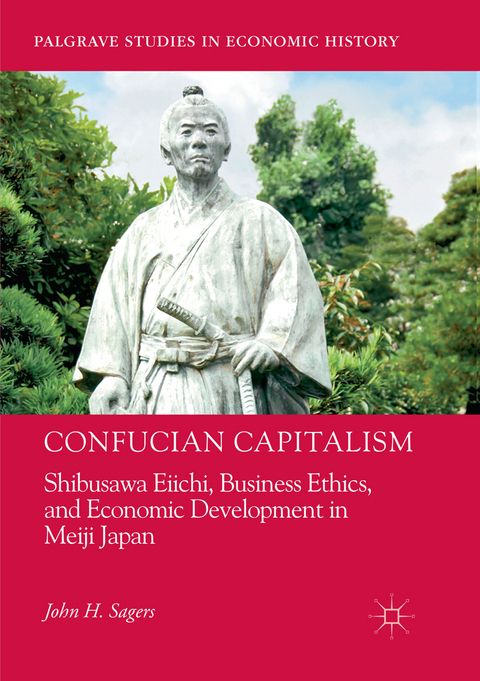
Confucian Capitalism
Springer International Publishing (Verlag)
978-3-030-09474-4 (ISBN)
With the life story of Shibusawa Eiichi (1840-1931), one of the most important financiers and industrialists in modern Japanese history, as its narrative focal point, this book explores the challenges of importing modern business enterprises to Japan, where the pursuit of profit was considered beneath the dignity of the samurai elite. Seeking to overturn the Tokugawa samurai-dominated political economy after the Meiji Restoration, Shibusawa was a pioneer in introducing joint-stock corporations to Japan as institutions of economic development. As the entrepreneurial head of Tokyo's Dai-Ichi Bank, he helped launch modern enterprises in such diverse industries as banking, shipping, textiles, paper, beer, and railroads. Believing businesses should be both successful and serve the national interest, Shibusawa regularly cautioned against the pursuit of profit alone. He insisted instead on the 'unity of morality and economy' following business ethics derived from the ConfucianAnalects. A top leader in Japan's business community for decades, Shibusawa contributed to founding the Tokyo Stock Exchange, the Tokyo Chamber of Commerce, and numerous educational and philanthropic organizations to promote his vision of Confucian capitalism.
This volume marks an important contribution to the international debate on the extent to which capitalist enterprises have a responsibility to serve and benefit the societies in which they do business. Shibusawa's story demonstrates that business, government, trade associations, and educational institutions all have valuable roles to play in establishing a political economy that is both productive and humane.
John H. Sagers is Professor of East Asian History at Linfield College, USA. He received his PhD in history from the University of Washington, USA; was a Fulbright Fellow at Rikkyo University, Japan; and held a Japan Foundation Fellowship. In 2006, he published his first book Origins of Japanese Wealth and Power: Reconciling Confucianism and Capitalism, 1830-1885 with Palgrave Macmillan.
Chapter 1: Introduction: Shibusawa Eiichi and the Idea of Confucian Capitalism.- Chapter 2: Economic Change and Intellectual Innovation in Tokugawa Japan.- Chapter 3: Government Bureaucrats and Capitalist Institutions in 1870s Japan.- Chapter 4: The Ethical Entrepreneur as a Servant of Japan's National Interest.- Chapter 5: Competing Priorities of Infrastructure Investment and Military Expansion in Late Meiji Japan.- Chapter 6: Business Leaders as Civilian Diplomats in Early Twentieth-Century Japan.- Chapter 7: Confucian Capitalism and the Search for Economic Prosperity and Social Harmony in Early Twentieth-Century Japan.- Chapter 8: Purposeful Preservation of Shibusawa Eiichi's Legacy.
"Shibusawa's enormous contribution to the economic success story of Meiji Japan, Sagers argues, was not primarily based on business interests but on mutual trust and on the time-honored values of moral commitment. These key attributes of the business ethics promoted by Shibusawa, which paid heed to the importance of social harmony, deserve the attention of the readers of the twenty-first century as well: in particular those with keen interest in East Asian religions." (Lehel Balogh, Religious Studies Review, Vol. 45 (2), June, 2019)
“Shibusawa’s enormous contribution to the economic success story of Meiji Japan, Sagers argues, was not primarily based on business interests but on mutual trust and on the time-honored values of moral commitment. These key attributes of the business ethics promoted by Shibusawa, which paid heed to the importance of social harmony, deserve the attention of the readers of the twenty-first century as well: in particular those with keen interest in East Asian religions.” (Lehel Balogh, Religious Studies Review, Vol. 45 (2), June, 2019)
| Erscheinungsdatum | 18.02.2019 |
|---|---|
| Reihe/Serie | Palgrave Studies in Economic History |
| Zusatzinfo | XVI, 245 p. 15 illus., 2 illus. in color. |
| Verlagsort | Cham |
| Sprache | englisch |
| Maße | 148 x 210 mm |
| Gewicht | 349 g |
| Themenwelt | Geschichte ► Teilgebiete der Geschichte ► Wirtschaftsgeschichte |
| Wirtschaft ► Allgemeines / Lexika | |
| Wirtschaft ► Betriebswirtschaft / Management ► Unternehmensführung / Management | |
| Wirtschaft ► Volkswirtschaftslehre | |
| Schlagworte | comparative capitalism • Confucian Capitalism • confucian ethics • Crony Capitalism • Economic history of Japan • Intellectual Innovation in Tokugawa Japan • Japanese business ethics • Japanese political economy • Japan's Meiji Financial Reforms • meiji japan • Private banking institutions • Private enterprise in modern Japan • Shibusawa Eiichi |
| ISBN-10 | 3-030-09474-X / 303009474X |
| ISBN-13 | 978-3-030-09474-4 / 9783030094744 |
| Zustand | Neuware |
| Informationen gemäß Produktsicherheitsverordnung (GPSR) | |
| Haben Sie eine Frage zum Produkt? |
aus dem Bereich


